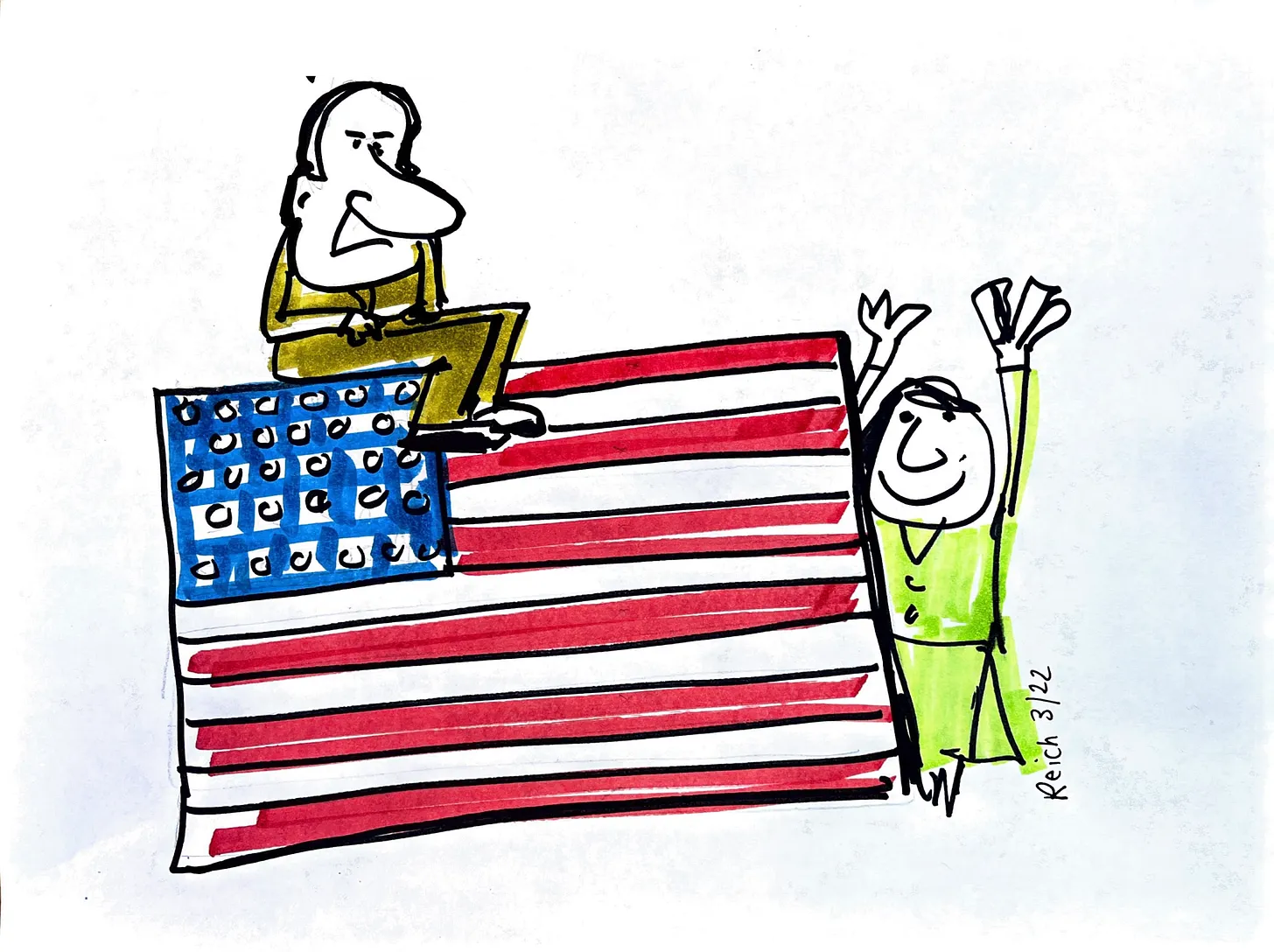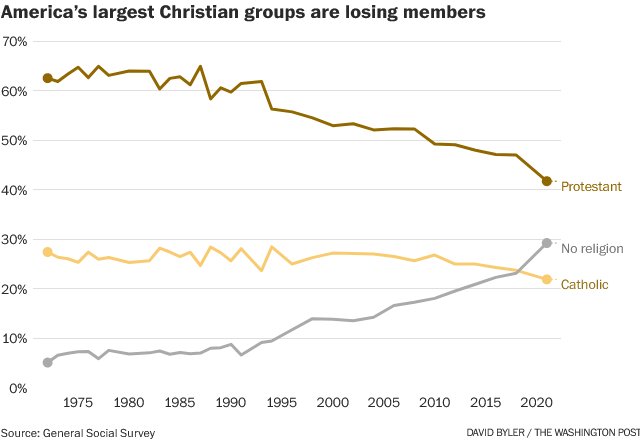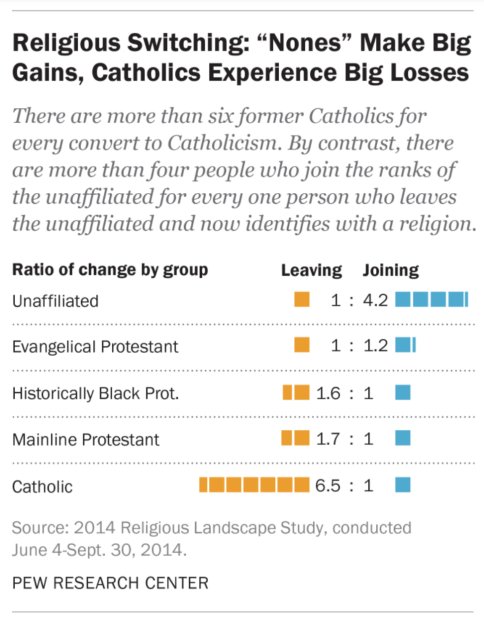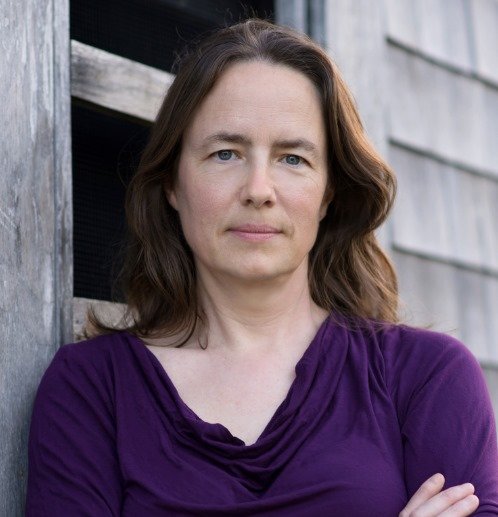- Two items about the decades-long trend of the decline (even) in the US of allegiance to organized religion, and how this fits into the theme of primitive v. mature moralities;
- Heather Cox Richardson reflects on the stages of American independence; Robert Reich contrasts patriotism with White Christian Nationalism; Tom Nichols misses the kind of patriotism he once knew.
The trend in declining allegiance to formal religion goes on, and has been completely predictable. Two examples today of the general trend, which has been under way for decades.
Washington Post, David Byler (‘data columnist’), 3 Jul 2023: Opinion | The GOP has a glaring Mormon problem
Opening:
Republicans often find themselves on the losing end of demographic shifts as the United States grows more racially diverse, better-educated and less religious. Only one long-term trend — the rapid growth of the reliably conservative Mormon Church — has consistently provided the GOP with good news.
But that consolation might be slipping away. Mormonism is in decline, and Democrats are gaining traction with younger church members. There are no easy solutions for the church or the GOP.
The point isn’t about Mormons in particular; it’s this general trend:
\
Case number two.
Hemant Mehta, Friendly Atheist, 4 Jul 2023: Faith “switching”: Religions are leaking members and can’t plug the holes fast enough, subtitled “Catholics, Mainline Protestants, and Black Protestants have struggled to retain members compared to a few decades ago”
Back in 2015, the Pew Research Center released a landmark study about the changing religious landscape in America, and there was one graph in particular I still think about to this day. I’ve even used it in presentations I’ve given to various groups over the years.
It involved religious “switching” and showed that people were leaving Catholicism, Mainline Protestantism, and Historically Black Protestantism at a much faster rate than they were entering. Similarly, people were “joining” the ranks of the religiously unaffiliated much more frequently than they were exiting. (Evangelical Protestants were growing, too, but at a much slower rate.)
\\

As I said, this has been going on for decades, with any number of articles about the “rise of the nones,” those who are leaving organized religions, or at least claim no allegiance to any of them. (Here’s an earlier post on this general topic, here, though the link to the source piece is defunct; it’s been transferred to here: https://onlysky.media/jhaught/the-long-slow-death-of-religion/.
\\
I’m mentioning the items today because this general topic fits neatly into a theme of recent days, the idea of Savannah morality and conservative values, and the hierarchy of morality (from Lawrence Kohlberg) that I discussed three years ago. And to realize today that this shift away from organized religion has been entirely predictable. As the world becomes more connected, as people (even in small towns) become aware of others unlike themselves, it becomes more and more difficult to sustain loyalty in one’s local tribe, to believe that your religion is the one true one and all the others are false.
To be optimistic, is it possible that the primitive moralities of the ancient religions are giving way to more mature, responsible, global moralities? Or that people simply realize that the supernatural claims of those religions are silly, and their stories and histories incoherent?
To be pessimistic, this trend has triggered a reactionary backlash of far-right authoritarian movements around the world, in the US with the MAGA crowd, with a similar movement in Greece (noted yesterday), and many others. Even if they make lots of noise and remain true minorities, they can easily wreck the world for the rest of us.
Further, the global trend toward secularism doesn’t assuage the deep-seated psychological needs many people feel for a sense of ‘meaning’ about life, needs that aren’t met by the brutal scientific facts about reality. This takes us back to Savannah morality, the sense that everything happens for a reason, the extension of childish perception into adult life, priorities for survival rather than understanding. The smart ones figure this out and see past those intuitions. Most people don’t.
\\\
On this July 4th:
Heather Cox Richardson summarizes the events leading up to the American Declaration of Independence (including a key pamphlet by my favorite founder, Thomas Paine), its immediate aftermath, and and later Civil War, which had to happen before the idea that “all men are created equal” began to be realized. She comments, near the end,
But just as in the 1850s, we are now, once again, facing a rebellion against our founding principle, as a few people seek to reshape America into a nation in which certain people are better than others.
(Cue Trump, DeSantis, and the Christian Nationalists.)
\

Robert Reich, 4 Jul 2023: True patriotism is the opposite of Trump’s White Christian Nationalism, subtitled “Thoughts on July 4th”
Reich quotes from Donald Trump’s rally last Saturday, in which “he advanced his version of patriotism based on White Christian Nationalism,” and then counters with this:
Rubbish.
The true meaning of patriotism is the opposite of Trump’s exclusionary White Christian Nationalism.
America’s moral mission has been toward greater inclusion — providing equal rights to women, Black people, immigrants, Native Americans, Latinx, LGBTQ+, Muslim, Jewish, atheist, and agnostic.
True patriots don’t fuel racist, religious, or ethnic divisions. Patriots aren’t homophobic or sexist.
And so on. Too much to quote here. Ending with:
America’s problem is not as described by Trump and his White Christian Nationalism — that the nation is losing its whiteness or dominant religion, that too many foreigners are crossing its borders, that men are competing in women’s sports or teachers are not celebrating the nation’s history.
America’s problem is that too many Americans — including its lawmakers — are failing to understand what patriotism requires.
\\
One more, noted to read later:

Tom Nichols, The Atlantic, 4 Jul 2023: Reclaiming Real American Patriotism, subtitled “This Fourth of July, let’s rescue our love of country from those who have hijacked it.”
Nichols, nominally a conservative, is a writer I admire. I reviewed one of his books here. For now I’ll just quote his opening para.
Nostalgia is usually an unproductive emotion. Our memories can deceive us, especially as we get older. But every so often, nostalgia can remind us of something important. As we celebrate another Fourth of July, I find myself wistful about the patriotism that was once common in America—and keenly aware of how much I miss it.









